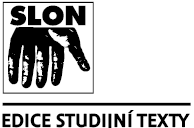
Svoboda, svědomí, soužití
Kapitoly z mezilidské etiky
[Freedom, Conscience, Coexistence. Chapters in interpersonal ethics.]
subjects:
philosophy
series:
SLON – Study Texts
e-book, 1. edition
published: november 2024
ISBN: 978-80-246-5459-1
e-book formats PDF
recommended price: 190 czk
summary
Ethics and freedom – how do they rhyme? Not exactly well, according to conventional wisdom. Ethics is nowadays claimed mainly by various moralists who are indignant about the corruption of the world. In the name of ethics, they promote this or that ‘moral order of the universe’ as a remedy, which usually turns out to be the habits and prejudices of the previous generation. All that remains of ethics are commands for a life of fear and obedience.
Philosopher Erazim Kohák rejects moralism. He advocates an ethic of living in freedom, and this necessarily grows out of freedom and responsibility, not out of fear and obedience. The ethics of freedom cannot be taught as a set of rules that a student can learn by heart and apply mechanically. The ethic of freedom can only be taught as a habit of critical thinking and responsible decision-making. We need to examine clearly and thoroughly all the conditions and possibilities in this or that situation. How we then decide is up to each of us. Therein lies the glory of human freedom and the demanding responsibility of freedom.
Kohák approaches ethics accordingly. He begins by exploring how to understand philosophical thought. As a working hypothesis, he defines it as thinking that asks three critical questions about everything – What does this mean? What is the basis for this? What does this entail? He then explores the place of ethics in human interaction, questions of relativism and absolutism, egoism and altruism, freedom and determinism. In the second half of the book, Kohák examines essential questions of value and meaning and critically investigates the possibilities and limits of religious ethics, the ethics of natural law, the ethics of consequences and the ethics of principles.
In his lectures Kohák opts for a readable essayistic tone, but not at the expense of philosophical conscientiousness. The reader who follows his deliberations attentively will acquire a very good orientation concerning the possibilities of ethics, along with the reasons for and against each of them. He will not, however, receive a computer program as a substitute for his own thinking and his own responsibility. Kohák’s approach is based on a deeply rooted stance of goodwill, but at the same time an equally deep fundamental respect for the other’s individuality. It provides readers with all that is needed for conducting their own critical thinking and decision-making, but refuses to make decisions for them.
The result is a book for anyone who takes seriously the responsibility of freedom and is unwilling to be carried along blindly with the crowd. It is also an ideal aid for anyone who has to teach ethics to young people but refuses to merely program them according to one template or another. Erazim Kohák provides something else: a handbook for living in freedom.
The book is part of Kohák’s trilogy on ethics:
Svoboda, svědomí, soužití (Freedom, Conscience, Coexistence) explores the ethics of interpersonal relationships
Zelená svatozář (The Green Halo) explores the ethics of human-nature relations
Průvodce po demokracii (A Guide to Democracy) explores the ethics of social relations